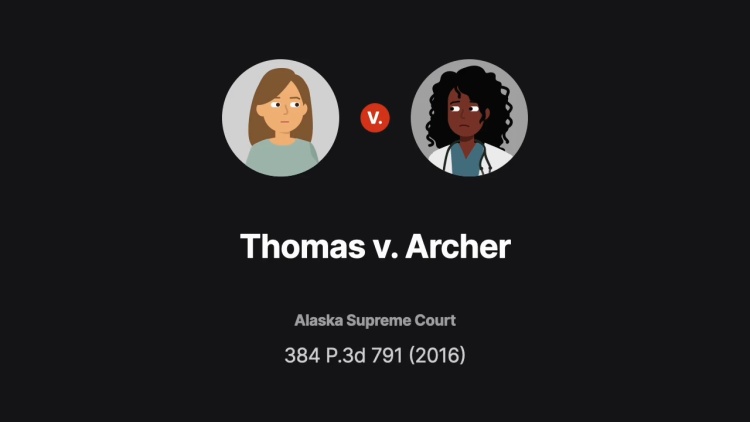Thomas v. Archer
Alaska Supreme Court
384 P.3d 791 (2016)

- Written by Mary Phelan D'Isa, JD
Facts
Rachel Thomas and her husband, Steven (plaintiffs), sued Dr. Sarah Archer and Ketchikan General Hospital (defendants) for breach of fiduciary duty, breach of contract, promissory estoppel, and negligent or intentional infliction of emotional distress. The claims were based on Dr. Archer’s alleged promise to contact the Thomases’ insurance provider and ensure coverage for the expenses related to then-pregnant Rachel’s emergency transport and subsequent treatment in Seattle. The Thomases alleged that when Rachel presented to the emergency room at the hospital, Dr. Archer assessed that she was at risk of premature delivery and recommended that Rachel be transported by medivac to Seattle, and that when the Thomases disclosed that such care needed their insurer’s preauthorization, Dr. Archer promised to call their insurer and if it would not approve the medivac, Dr. Archer and the hospital would. Dr. Archer failed to contact the Thomases’ insurer until much later, and the insurer denied the Thomases’ claim. The Thomases testified that they would have taken the medivac even if it was not covered, but that they would not have gone until they called their insurer if they had not believed Dr. Archer. It was undisputed that Steven signed a form acknowledging personal financial liability and holding the hospital harmless for the costs of the medivac. After finding that Dr. Archer’s fiduciary duty to the Thomases was limited to the context of medical treatment and that there was no enforceable contract between the parties because there was no actual, clear promise to the Thomases or substantial change in the Thomases’ position, the trial court granted summary judgment for Dr. Archer and the hospital on all claims. The Thomases appealed.
Rule of Law
Issue
Holding and Reasoning (Maassen, J.)
What to do next…
Here's why 911,000 law students have relied on our case briefs:
- Written by law professors and practitioners, not other law students. 47,100 briefs, keyed to 997 casebooks. Top-notch customer support.
- The right amount of information, includes the facts, issues, rule of law, holding and reasoning, and any concurrences and dissents.
- Access in your classes, works on your mobile and tablet. Massive library of related video lessons and high quality multiple-choice questions.
- Easy to use, uniform format for every case brief. Written in plain English, not in legalese. Our briefs summarize and simplify; they don’t just repeat the court’s language.





